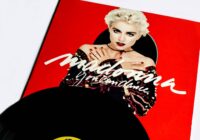Taylor Swift is the greatest entertainer of the millennium. So far, anyway. But, with only 977 years to go, it will take someone special to displace her. She dominates the digital era more consummately than Elvis bossed the 1950s, or the Beatles commanded the 1960s. Madonna and Michael Jackson towered over the 1980s and 1990s but neither seemed to hold their audiences as spellbound as Swift seems to. No one has quite mastered the art of transforming doting fans into obedient acolytes. And no one in history has ever appealed to such a bewilderingly wide demographic. A recent Wall Street Journal poll found that 44 percent of the adult US population considered themselves Swift fans. It’s impossible to find other artists whose appeal spanned the generations like this.
Whisked Away By The Zeitgeist
The fascination with Swift is probably unparalleled: worldwide and seemingly inexhaustible. Fifteen years ago, she was a sweet, skillful and promising country singer. Today, she is the seventh wonder of the world. Last November, tickets for her forthcoming Era tour were released to “verified” fans: the demand was so unprecedented that the Ticketmaster site crashed under the weight of “extraordinarily high demands” and “insufficient” tickets. About 2.4 million fans applied. Within days, it was reported that prices for single Era tour tickets were listed on resale sites as high as $17,860 — a price beyond all but affluent adults (passionately devoted affluent adults too) or child stars.
The tour — which starts March 17 — is intended to support Swift’s tenth album Midnights. Even at a time when physical sales of recordings are a relic of the previous century, Swift’s album sold 1.5 million units in its first week of release in October, 2022 — the first time a musician had sold over a million in an opening week since Swift herself did so with Reputation in 2017. Streaming of Midnights exceeded a billion in days. In 2022, Forbes estimated her personal wealth to be $570m.
Some artists are just meant to be: Elvis and the others mentioned earlier were pop gods in waiting: so close to the zeitgeist they were, like Dorothy and Toto, bound to be whisked away and carried to greatness, their music, demeanor, look, antics perfectly in harmony with the times. Others are harder to figure out: Swift is one of them. It’s easy to mistake her music for good rather than brilliant. She looks interesting, but not in the same flamboyant way as, say, Rihanna or Lady Gaga. There have been no outrageous stunts or splashy displays of wealth that typically guarantee the kind of coverage Kim Kardashian and her siblings have exploited so expertly. Swift has either steered or been swept clear of caricatured performances.
Her only moment that came close to explosive was at the 2009 MTV Video Awards ceremony when the artist formerly known as Kanye West interrupted her acceptance speech and sparked a long feud. West aka Ye later claimed he was motivated by god to make his intervention. If so, god might legitimately be considered to have delivered Swift to her eminence. Because the years-long dispute with Ye probably boosted her reputation.
Yet, she is unmistakably great — and I use the word as an attribution rather than a property: if enough people acknowledge her greatness, she actually is great. So, why is she considered so illustriously above the average?
Authenticity by Kismet or Design?
The greatest entertainers are those who understand how much of themselves to reveal to audiences. For most of the twentieth century, a little went a long way and performers allowed only glimpses of what used to pass as private lives. All that changed with the onset of celebrity culture and, today, anyone with ambitions in the entertainment industry is obliged to sign a Mephistophelean contract: success is conditional on the surrender of private lives. Swift was only fifteen when she signed for Big Machine, a Nashville label, in 2005. For the next 10 years, she was a meticulous chronicler of her own developing status: her records were mostly autobiographical reflections on “my-life-as-a-popstar.”
Will Smith’s Gift to Racists — and Misogynists
Media studies scholar Maryn Wilkinson thinks this “authenticity” was crucial to Swift’s early success and it made her relationship with fans almost intimate. Los Angeles Times’ Mikael Wood reckons the intimacy “wasn’t a product of kismet but of design” but her music was so shimmering that “eventually you stop caring what’s drawn directly from Swift’s real life and what’s not.”
It’s worth pondering this point because the sense of intimacy Swift created endured. No artist has used social media more artfully than Swift. The Guardian writer Alim Kheraj calls her “a ringmaster of fan service,” the reference to the ringmaster suggesting how she conducts and directs her fans. And remember, her fan base spans the age spectrum, so her ability to coordinate is quite a feat.
Were Swift’s progress uneventful, her personal history might not have captivated her fans. But it was anything but: she had a major fall-out with Big Machine’s owner Scott Borchetta when in 2019 he sold the label to Ithaca Holdings, owned by Scooter Braun, whom Swift disliked. While Swift had negotiated a deal with Borchetta that allowed her to own the masters of later albums, the ownership — and thus ability to earn from — her first six albums transferred to Braun. This meant that he could earn money from the use of Swift’s early music in, for example, advertising, tv programs, films and so on. She would have no control over where and how her music would be used. Characteristically, Swift made her annoyance well known on Instagram, Tumblr and other social media.
Qatar Will Change the World Cup Forever
An acrimonious and serpentine dispute ensued and fans were offered ringside seats as both Swift and Braun vented on social media. Feuds like this are reliable ways of galvanizing interest. Swift resolved to re-record her early music, announcing this on social media, of course. She did exactly that and, with typical ringmaster’s flair, urged her fans to buy the new recordings, even if they already owned the originals. Sales suggested they were mostly compliant.
What Next?
This wasn’t the only splenetic dispute that kept Swift occupied. The earlier-mentioned incident with Ye in 2009 started a squabble that dragged on for several years. Celebrity feuds are usually popular with audiences and serve to keep the disputants in the news. Ye was presumably aware of this when he rapped, “I made that bitch famous” on his 2016 track “Famous.” The altercation broadened when Ye’s then wife Kim Kardashian got involved. Her involvement at any level guaranteed a global audience, not just of observers, either: the heated exchanges were conducted largely on social media, allowing interested fans to feel they were participating.
The disputes lend a nimbus of complexity to Swift: she may bewitch fans with her music, but she makes a no-holds-barred enemy if you cross her. Her fights are spectator sports but ones in which her fans are allowed to brawl too. And not just on social media: they buy her albums, if only to ensure she wins the day. When someone, especially a god-fearing American, wields the kind of influence over human life, thought and action Swift evidently does, the imagination starts to wander and the mind starts to wonder: What might she do next?
She could break Spotify’s single-day streaming numbers again. Or sell-out a record number of concerts at record high ticket prices. And she could carry on winning every conceivable music award. Or she could try something new.
Unsurpassed Influence
In 2018, Swift celebrated her win at the American Music Awards by urging her followers to vote in the midterm elections. For years, her blue eyes and blonde hair endeared her to the US’s alt-right, the rightwing movement that rejects mainstream politics and uses online sources to disseminate its supremacist ideology. But her injunction put paid to the alt-right rumors and appeared to align her with the Democrats, a party for which she could become valuable. Influence comes in many shapes and forms. When a popstar, then not even 30, tells voters to exercise their right, it might not make much difference. There again, maybe it will.
Is Oprah the Most Influential Person Ever?
In September 2021, in Fair Observer, I asked the question: Is Oprah the Most Influential Person Ever? I thought she was. Now, I think Swift surpasses her. Think of her demographic: not just teenagers or starry-eyed twentysomethings, but heads of family, perhaps even grandparents. I repeat the figure 44 percent of all Americans. I doubt if any pop singer in history ever had such wide and deep appeal. Within that dense fan base is a dutiful alliance committed to maintaining her dominion. Swift’s onetime adversary Ye plans to run for president in 2024 and, while Swift herself has given no indication that she has no comparable ambitions, there’s a temptation to ponder what theoretically she could achieve in 2028. She will be 39, four years younger than John F. Kennedy was when he was inaugurated as President.
[Ellis Cashmore’s latest book is The Destruction and Creation of Michael Jackson.]
The views expressed in this article are the author’s own and do not necessarily reflect Fair Observer’s editorial policy.
Support Fair Observer
We rely on your support for our independence, diversity and quality.
For more than 10 years, Fair Observer has been free, fair and independent. No billionaire owns us, no advertisers control us. We are a reader-supported nonprofit. Unlike many other publications, we keep our content free for readers regardless of where they live or whether they can afford to pay. We have no paywalls and no ads.
In the post-truth era of fake news, echo chambers and filter bubbles, we publish a plurality of perspectives from around the world. Anyone can publish with us, but everyone goes through a rigorous editorial process. So, you get fact-checked, well-reasoned content instead of noise.
We publish 2,500+ voices from 90+ countries. We also conduct education and training programs
on subjects ranging from digital media and journalism to writing and critical thinking. This
doesn’t come cheap. Servers, editors, trainers and web developers cost
money.
Please consider supporting us on a regular basis as a recurring donor or a
sustaining member.
Will you support FO’s journalism?
We rely on your support for our independence, diversity and quality.







Comment